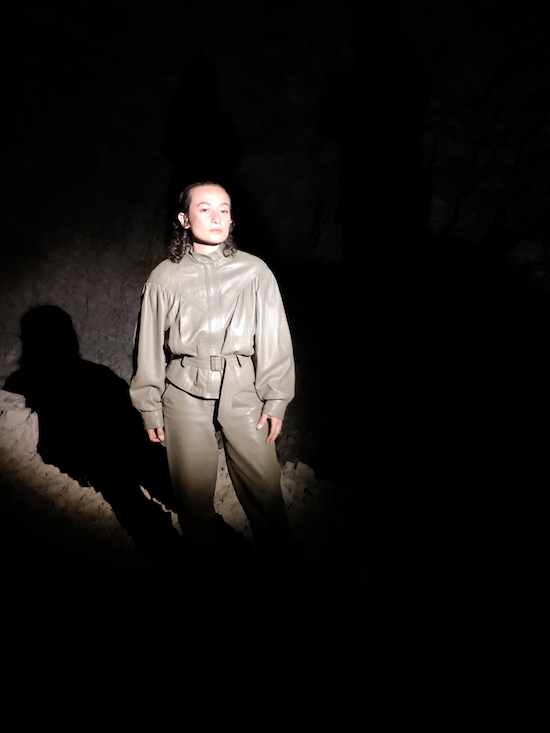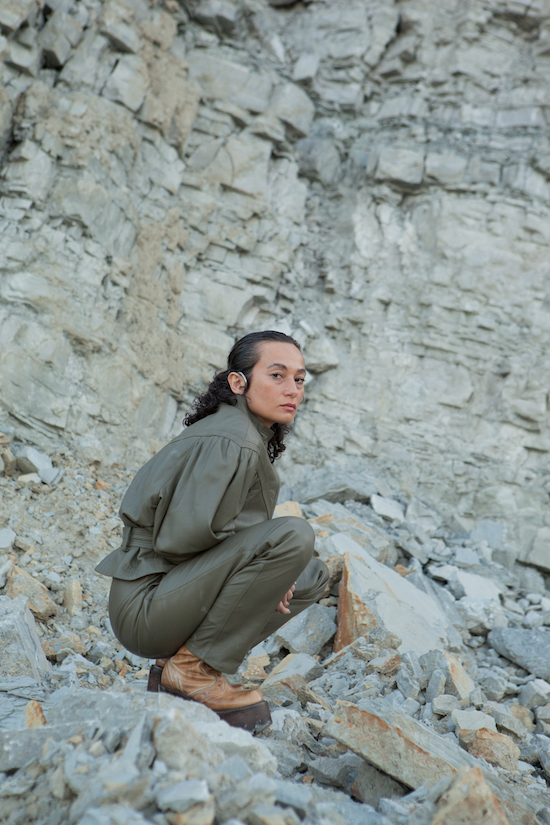All Nene H portraits by Mara Ploscaru
“Electronic music is like singing”, remarks Nene H. “You can use many different techniques and languages, but the transfer of feeling is very intuitive and direct.” She’s explaining her transition from classically trained pianist to electronic musician, a journey which has taken her from a conservatory education in her native Turkey to a scholarship in Stuttgart, and on to the dance floors of Berlin and beyond.
Though known primarily for her fearsome techno sets, the DJ and producer, who now splits her time between Berlin and Copenhagen, was actually a relatively latecomer to the world of electronic music. “My first party in Berlin, I was 26 or something”, she explains. “It was super late. I was a nerd, I just practiced piano all my life, I didn’t know anything!” Having cut her teeth performing at the likes of Berghain, Berlin’s CTM and Atonal festivals, and Possession in Paris, Nene H’s debut album Ali, released on Incienso this month, is a notable departure from her previous work. Beautifully crafted and sonically complex, the album is built around ominous drones, reverb-soaked poems and prayers – sung in both German and Turkish – and sampled Turkish flutes scattered across a backdrop of haunting modular synth lines. The brutal kick drums – the only clear signifiers of an aesthetic rooted in techno – feel almost shocking when they appear, juxtaposed against the hypnotic quality of the rest of the record.
The album is also thematically complex. Indelibly marked by family tragedy, it is first and foremost a meditation upon death and the process of grieving. However, throughout its compact, eight-track journey, the album also explores several dualities which have shaped Nene H’s life and artistic practice: the contrast between Western and Middle Eastern approaches to sound, the complexities of navigating both German and Turkish identities, and the dichotomy between the hedonism and the healing potential inherent in electronic music.
Though much of our conversation hinges on gloomy subject matter, Nene H is nonetheless incredibly warm and eager to talk when we connect over Zoom from her apartment in Neukölln. Music has been central to her life from a young age, she explains: “I went into the conservatory in Turkey when I was 11. My parents let me go because they were like, ‘She’s going to get bored of it and become a doctor.’” Born Beste Aydin in Istanbul, but raised in Izmir – Turkey’s third-largest city – Nene quickly proved to her parents that music was going to be more than just a phase. “I was doing really well in the conservatory”, she goes on. “They were a little bit scared about it, but then they saw that I was doing good, they wanted to support me even though they didn’t have any idea what western classical music was.”
Her abilities on the piano meant that she was selected to receive a scholarship. At age 20, she moved to Stuttgart, in southwestern Germany, to enrol in music school. However, she quickly became disillusioned with the confines of the classical music education she was receiving. “All these other musical languages are completely locked away. It very much represents this privilege: tickets [to classical concerts] being 250, 300 Euros, people going there in fancy clothes, it started getting to me.” She also struggled to gel with Stuttgart, a place she describes as “a shitty, small, racist city.” After what she calls “six nasty years of studying”, she moved to Berlin, where she encountered a more open and cosmopolitan version of Germany, and instantly connected with the city’s grittier musical subcultures.
Electronic music, and techno in particular, opened up more intuitive pathways for her to explore her yearning to compose, and she remains rooted in what she sees as the organic origins of the genre: “Techno might be this crazy popular thing, but actually the basics of techno come from this very pure intention that is political, that is for people, and not about money and success and all that game.” Like increasing numbers of electronic musicians, she was also drawn to modular synthesis as a more tactile way of producing electronic music. “I’m a pianist. I want to touch and play”, she says. But it was as much to the Turkish music of her childhood that she turned when composing the album. The decision to integrate the music of her homeland into the electronic structures she had learnt in Berlin came about after the sudden death of her father in 2018. “He was 55. He was actually quite young, and it happened quite suddenly. He was my muse, the guy who let me do all these things. I grew up in a Muslim religious family, and even though he was also Muslim and very protective over me, he always let me do the things I wanted to do, which for that type of Turkish family is not typical.”
The opening track ‘Letzes Pech’ (German for ‘latest bad luck’) directly addressed the tragic fate that had befallen her father. “He was quite an unlucky man. He was still a very happy man and a very thankful man, but I always had this feeling of, ‘Why did this always happen to him?’” She goes on to describe her dad’s unexpected musical tastes: “He was so open-minded. The first time I showed him electronic music, I was showing him Aphex Twin, and he was like, ‘I love this! This is crazy!’ I think anything that I would play him, he would love. He was just that kind of guy.”
Though not entirely chronological, the album narrates the process of dealing with death. The third track ‘We Wait’, explores the nebulous emotional state of preparing for a death that has been foretold. “He had a heart attack and then he was in a coma for three months”, she says, “and we were waiting. I would come to Turkey, I would visit him in the intensive care unit and then I had to play on the weekend. I would go play and come back. It was so hard.”
Composing the album was also a way to come to terms with her own grief. The track ‘How We Say Goodbye’ contained recordings of the Islamic prayers that her family recited following her father’s passing. “On the first, third, seventh and fourteenth days [after a death], there are some Quran readings at home”, she explains. “The day after he passed, I started recording the prayers. I was recording them because I had to do something to honour him”. Recording and processing the prayers felt like a more meaningful way of saying farewell. “They told me that I should be reading these prayers every day after his passing, but I couldn’t. I was brought up Muslim but I don’t open and read Quran everyday. I wanted to keep a part so I can listen to it sometimes, for myself, because I’m not going to read it”.
The differences between Turkish and German cultural attitudes to grief also stood out for her: “In Turkey people react a lot differently. People don’t grieve alone. Unlike here [in Germany], where people are like, ‘Whatever you need, whatever you need’, [in Turkey], there’s like 40 women running around for my mum. It’s a mess. It’s so in your face and they’re talking to you all the time. I come to Germany and everybody is like ‘I’m sure he’s in a good place now.’” Exploring the contradictions of occupying both a sense of German and Turkish identity also influenced the linguistic choices on the album, which features chants, prayers and diary entries spoken in both German and Turkish, while the track titles are all in German or English. The decision to incorporate all these different languages is linked to her sense of being a “three-dimensional thing. Culturally, I became in-between everything. The track ‘We Wait’, for instance, is in German but the name is in English, just to fuck with it, because I am fucked up in that sense.”

The experience of visiting her father in intensive care in Turkey, and then going back to perform in clubs in Berlin presented its own set of intense contradictions. The track ‘Rau’, featuring a low mantra-like verse sung in Turkish, speaks to the hedonism of the Berlin music scene. After returning from Turkey, she slowly began going out to clubs again, but would often leave early. “Coping with it was really hard. [‘Rau’] is about me meeting a guy in a club, and how this guy, as privileged as he is, is having the time of his life and no idea of not having anything.” At the same time, immersing herself in club life was a way to cope with the deep wound of parental loss. “The clubs were how I could cope. I remembered what clubs mean for so many people: it’s a place where they find their soul, they find free space and they find meaning. Of course there are people who are having the best time, then there are also people who are suffering, like me, and still going partying.”
This impulse to explore the healing potential of music was partly influenced by a trip to India, which was funded by Musicboard, a German grant-giving institution for the arts which had awarded her a grant to buy the modular synths that were used on the album. The project, which took place a year before her father’s death, started out as a two month residency. “It was like a musical exchange programme. It was a chance to sample a lot of stuff and meet lots of people, lots of musicians.”
Travelling across northern and central India, the trip soon exposed her to different musical traditions and approaches to sound. She was particularly struck by a meeting with a group of Tibetan monks she encountered. “I met this Tibetan religious group, in a religious gathering. I was crying all the time, it was crazy.” The impact of Tibetan mantras, and their transformative potential, can be felt most keenly on the track ‘Gebet’, which features a haunting mantra sung over a devastating kick drum, and is, to my mind at least, the most mesmerising track on an album which is a powerful sonic document of healing. “That trip was so much about the essence of music. It’s a lot bigger than Western cultures: music is there for all the most basic human needs. Before language there was sound. It’s a lot deeper than what is given to us.”
Ali is out on Friday via Incienso


